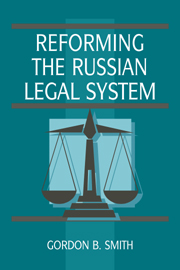Book contents
- Frontmatter
- Contents
- Preface
- 1 Pre-revolutionary Russian law
- 2 The Bolshevik experience
- 3 The history of legal reform
- 4 Forging a new constitution
- 5 Citizens and the state: the debate over the Procuracy
- 6 In search of a just system: the courts and judicial reform
- 7 Law and the transition to a market economy
- 8 Legal reform in the republics
- 9 Legal reform and the transition to democracy in Russia
- Appendix: Constitution of the Russian Federation
- Notes
- Index
8 - Legal reform in the republics
Published online by Cambridge University Press: 09 October 2009
- Frontmatter
- Contents
- Preface
- 1 Pre-revolutionary Russian law
- 2 The Bolshevik experience
- 3 The history of legal reform
- 4 Forging a new constitution
- 5 Citizens and the state: the debate over the Procuracy
- 6 In search of a just system: the courts and judicial reform
- 7 Law and the transition to a market economy
- 8 Legal reform in the republics
- 9 Legal reform and the transition to democracy in Russia
- Appendix: Constitution of the Russian Federation
- Notes
- Index
Summary
The worst legacy we have from the Stalin era is the way we think. And we cannot obtain new thinking on credit.
Oazug Nantoy, Moldovan reformerThe challenges and course of legal reform in Russia has been paralleled in many respects by reform efforts in other newly independent states of the former USSR. Each nation has had to struggle with building an independent and just court system, revise existing laws, or draft new codes governing virtually every branch of the law. Several of the nations emerging from the former USSR have adopted new constitutions that delineate the powers of newly established parliaments and executive offices. To varying degrees these new countries have concerned themselves with protecting human rights, overcoming centuries-long legacies of authoritarian rule and absence of civil liberties. Many of the newly independent states have begun to privatize state-owned assets, including the land, and debated how this can be done equitably. Finally, most of these countries have had to address the issue of their multiethnic nature – how much power should reside in central institutions, how much power should remain at the local and regional levels? What rights should be granted to Russians and other non-indigenous peoples residing in these newly independent states? And most importantly, how can governments keep centuries-old interethnic hatreds from erupting into violence?
While the conditions these nations face are in many ways similar, their responses have by no means been uniform.
- Type
- Chapter
- Information
- Reforming the Russian Legal System , pp. 191 - 225Publisher: Cambridge University PressPrint publication year: 1996



